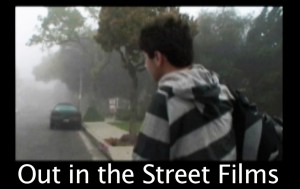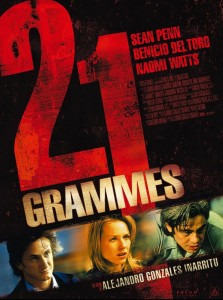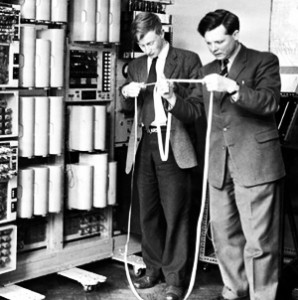by Andrew Einspruch
Filmmaker Andrew Einspruch attended Screen Forever 2013, the conference of Screen Producers Australia, this past year and wrote a series of articles for the event, which he’s kindly allowing us to reprint here. These articles originally appeared in Screen Hub, the daily online newspaper for Australian film and television professionals.
Video on demand (VOD), digital distribution, and the changes industry and consumers face every day were all over Screen Forever 2013. Andrew Einspruch digs through a piles of notes to find the jewels.
The world of screen entertainment and content is going VOD. That much is inarguable. Yes, there are issues, and yes, we’re not there yet (whatever your version of “there” happens to be). But it does not take much squinting to see that it won’t be that long before all content is delivered online, and it will be on demand for consumers to enjoy when, how and where they want.
Even so, you’d be forgiven for rolling your eyes, and thinking that, for now at least, it was more of a pain than it was worth. Or that it was too overwhelming. Or that it was impossible to make a decision about which way to go, or even if can do anything because of contracts signed long ago. Wendy Bernfeld, Managing Director of Rights Stuff, started a session called “Catching the Digital/VOD Wave” with the following common thoughts about VOD:
- “Too complicated, time-sucking.”
- “There’s no money in it.” or “I did a deal (once) and got a check for $100.”
- “It’s OK for America/big brands, but doesn’t really apply in [insert country].”
- “I can‘t get the [internet/mobile/VOD] rights” and/or “The [broadcaster/distributor/sales agent] took them/sat on them.”
- “We’re blocked in [country] by [insert: legislation, tax, exhibitors, etc.].”
- Who wants to watch movies on a [mobile/pc] anyway?
Any of those sound familiar? If you are a producer, the odds are good you’ve muttered at least one of them.
And yet…
 Strategy is a great personal passion, but something I find few people have an adequate grasp of. While the basic assumption seems to be that advice of all kinds is inherently strategic and of value, it is often anything but. Any given suggestion or piece of advice is only worthwhile inasmuch as it allows the attaining of a goal — without knowing that goal and measuring the success of attempts to attain it, you are not operating strategically: you are merely using tactics of unknown value.
Strategy is a great personal passion, but something I find few people have an adequate grasp of. While the basic assumption seems to be that advice of all kinds is inherently strategic and of value, it is often anything but. Any given suggestion or piece of advice is only worthwhile inasmuch as it allows the attaining of a goal — without knowing that goal and measuring the success of attempts to attain it, you are not operating strategically: you are merely using tactics of unknown value. 

 There is a lot of talk in independent film circles about the need to “eventize” the cinematic experience. The thought is that audiences are increasingly satisfied with viewing films and other video material on their private devices whenever their schedule permits and the need to leave the house to go to a separate place to watch is becoming an outdated notion, especially for younger audiences. But making your work an event that can only be experienced in a live setting is something few creators are exploring at the moment. Sure, some filmmakers and distributors are adding live Q&As with the director or cast, sometimes in person and sometimes via Skype; discussion panels with local organizations are often included with documentary screenings; and sometimes live musical performances are included featuring the musicians on the film’s soundtrack, but what about work that can ONLY be enjoyed as a live experience? Work that will never appear on DVD or digital outlets? Not only is there an artistic reason for creating such work, but there can be a business reason as well.
There is a lot of talk in independent film circles about the need to “eventize” the cinematic experience. The thought is that audiences are increasingly satisfied with viewing films and other video material on their private devices whenever their schedule permits and the need to leave the house to go to a separate place to watch is becoming an outdated notion, especially for younger audiences. But making your work an event that can only be experienced in a live setting is something few creators are exploring at the moment. Sure, some filmmakers and distributors are adding live Q&As with the director or cast, sometimes in person and sometimes via Skype; discussion panels with local organizations are often included with documentary screenings; and sometimes live musical performances are included featuring the musicians on the film’s soundtrack, but what about work that can ONLY be enjoyed as a live experience? Work that will never appear on DVD or digital outlets? Not only is there an artistic reason for creating such work, but there can be a business reason as well. You’re an indie filmmaker. You can get by with relatively inexpensive equipment, cast and crew and make movies. I made a short a few years ago for $3K, just for camera, sound, and editing software. Then I used the same stuff to do another one for the cost of feeding the cast and crew, about $500. A few years later I made a feature doc for $3K with some new HD stuff. But you don’t need a cast or crew for docs. All you need is a camera, editing software, and great events to attend. However, if you do want a cast and crew, and you don’t happen to know film school buddies willing to work for free, you really have to pay them, and you may need locations, props, and so on. So we see budgets more likely starting at $50K to $500K for first time feature director narratives.
You’re an indie filmmaker. You can get by with relatively inexpensive equipment, cast and crew and make movies. I made a short a few years ago for $3K, just for camera, sound, and editing software. Then I used the same stuff to do another one for the cost of feeding the cast and crew, about $500. A few years later I made a feature doc for $3K with some new HD stuff. But you don’t need a cast or crew for docs. All you need is a camera, editing software, and great events to attend. However, if you do want a cast and crew, and you don’t happen to know film school buddies willing to work for free, you really have to pay them, and you may need locations, props, and so on. So we see budgets more likely starting at $50K to $500K for first time feature director narratives. 
 There’s a certain watercooler betting-pool mentality that accompanies the box office results of movies, as though their success were completely encapsulated in a single opening weekend’s results. This despite the fact that everybody knows Hollywood accounting is particularly slippery, that budgets never reveal the accompanying marketing costs of films, that foreign market revenue is increasingly important to the success of many films, and that ancillarly sales can be a primary rather than secondary revenue stream. Nonetheless, we seem to equate box office numbers with whether a film worked, whether it’s worth anyone’s time, and whether it’s going to ruin somebody’s career or save it.
There’s a certain watercooler betting-pool mentality that accompanies the box office results of movies, as though their success were completely encapsulated in a single opening weekend’s results. This despite the fact that everybody knows Hollywood accounting is particularly slippery, that budgets never reveal the accompanying marketing costs of films, that foreign market revenue is increasingly important to the success of many films, and that ancillarly sales can be a primary rather than secondary revenue stream. Nonetheless, we seem to equate box office numbers with whether a film worked, whether it’s worth anyone’s time, and whether it’s going to ruin somebody’s career or save it.  If you aren’t shooting in 4K (aka Ultra HD or UHD), you’re two years late. In two years from now any film you shot in HD will be as obsolete as the stuff you shot in SD. But don’t take my word for it, and expect that within a few weeks or sooner, there will be new advances announced.
If you aren’t shooting in 4K (aka Ultra HD or UHD), you’re two years late. In two years from now any film you shot in HD will be as obsolete as the stuff you shot in SD. But don’t take my word for it, and expect that within a few weeks or sooner, there will be new advances announced. 